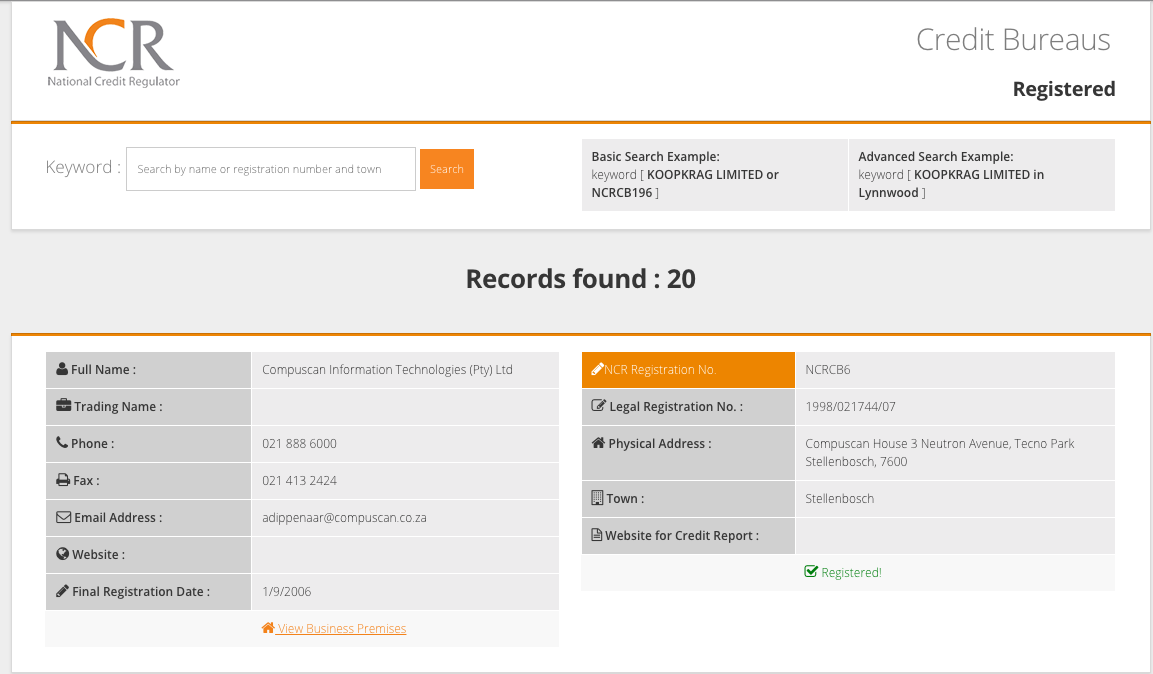
Free credit report South Africa
The credit report is, as the name says, a document that shows your credit history. This can be used to apply for loans, but you can do a checkup from time to time…
The credit report is, as the name says, a document that shows your credit history. This can be used to apply for loans, but you can (and it is recommended to) do a checkup from time to time to learn more about your current financial status.
However, whereas you’re an entrepreneur looking to get more financing for their business, or you’re a regular person, looking to get a loan for their home (or another grand project), you will need to get a credit report before you can even think about applying.
This report tells potential lenders about your level of responsibility (from a financial point of view). It contains information about how you handled credit in the past and if you have any debts. So, if you’re not aware of your current situation, it’s best to request a credit report before your possible lenders do (they have the legal right to do so).
The credit report is a detailed document and contains your credit history with information like:
Overall, the main purpose of this report is to establish your creditworthiness and this is highly based on your credit score.
The credit score is a number and tells a possible lender if you are a responsible adult who can be trusted with a loan. Also known as credit rating or FICO Score (it was created by created by Fair Isaac Corporation), this number ranges between 300 and 850.
But what does this mean? If you’re not knowledgeable in the world of finances, this number won’t tell you much. You may know that, if the score is closer to the upper limit it means your situation is good (or ideal, if the score is 850), but it’s important to completely understand the significance of this score. That is, if you truly want to learn about your financial situation.
Here are the factors that comprise the final credit score and their importance in the formula:
As you can see, payment history and the amount you owe are extremely important in deciding the final score. Of course, other factors are important as well, but your level of risk is decided by your past behavior.
It’s also important to know that your credit score will be different from one South African credit bureau to another because every institution calculates it differently. They consider different weights for the major risk factors, which is why it’s important to get as many copies of your report as possible.
You may wonder towards the importance of knowing your credit score, especially if you’re not interested in a loan (right now). Regardless of your current position, it’s important to be aware of your financial credibility for any future decisions.
Let’s say you decide to open a business; even if right now you have the necessary funding, it’s important to show your partners that you’re responsible. It’s also a plan B in case things don’t go as planned. But what if you don’t want to open a business or buy a house, or make any important financial decisions? Is the credit report still important? Yes, you should be aware of your credit health at all times because it provides you with clues when opportunities show up and, you can avoid horrible surprises such as identity theft (a trend on the rise in South African countries).
Overall, a credit report can offer solid facts that can be helpful regardless of your future plans. If you know how you stand, you have all the data to make good decisions that will lead to growth, both personal and financial.
According to the law, you are entitled to receive a free copy of your credit report from the top three credit report agencies:
It’s very important that you request a copy of your credit report from all three agencies because each have their own view on the matter. Even more, possible lenders usually work with only one agency, but you don’t know which.
Thus, if one of these agencies has a version of your report that contains errors or inaccuracies, your submission for credit may be declined because of this. If you spot a problem with your report, you are entitled to ask the agency to check their data and update the report.
You can also request a free copy from AnnualCreditReport.com, but only once a year. Finally, if you applied for a loan but your request was denied, within 60 days you are entitled to a copy of your updated credit report. You can also ask to see your report if you are on welfare or unemployed, or if you suspect your report is inaccurate.
Depending on the agency you address, you may be asked to pay a fee for your report. Yes, you are entitled to one free copy, but any other additional requests to see your report credit can (and in many cases are) be charged.
The idea behind this practice is that one needs to see their credit report at least several times a year, if not every month. Based on this, there is an entire niche of businesses that offer to calculate your report score and interpret it for your needs.
For instance, you can subscribe to one of these credit checkers and receive an interpretation of your financial situation and trustworthiness every month. You will also receive information on how to improve your score, graphics, pie charts, and more – all to justify paying for something you should receive for free.
You are entitled to one free copy of your credit report each year (according to the National Credit Act). This means that the first copy you get is free, regardless of the agency or credit bureau you address. Knowing this and considering there are plenty of businesses eager to have you as their customer, you can play the field and get free credit reports whenever you need them.
Sure, they won’t come with all that extra information, but with a bit of research, you can learn those by yourself.
Here is a list of agencies, credit checking businesses, credit bureaus, and other institutions you can ask for a free copy of your report:
At the end of the day, the most important thing to get out of this article is that you must be up to date on your financial situation. Credit reports are the best way to do so, but it also matters your knowledge of the information you receive through these reports.

However, there is no need to add another financial burden to your collection by registering to services that promise to deliver these reports. With a bit of research and a thorough list of existing credit bureaus in South Africa, you can get the information you need for free. Just make sure you stay up to date with what happens in your country, in all niches that matter!